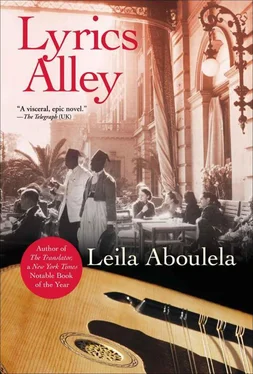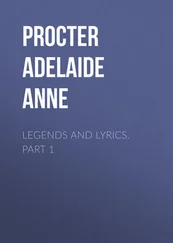Leila Aboulela - Lyrics Alley
Здесь есть возможность читать онлайн «Leila Aboulela - Lyrics Alley» весь текст электронной книги совершенно бесплатно (целиком полную версию без сокращений). В некоторых случаях можно слушать аудио, скачать через торрент в формате fb2 и присутствует краткое содержание. Год выпуска: 2011, Издательство: Grove Press, Жанр: Современная проза, на английском языке. Описание произведения, (предисловие) а так же отзывы посетителей доступны на портале библиотеки ЛибКат.
- Название:Lyrics Alley
- Автор:
- Издательство:Grove Press
- Жанр:
- Год:2011
- ISBN:нет данных
- Рейтинг книги:5 / 5. Голосов: 1
-
Избранное:Добавить в избранное
- Отзывы:
-
Ваша оценка:
- 100
- 1
- 2
- 3
- 4
- 5
Lyrics Alley: краткое содержание, описание и аннотация
Предлагаем к чтению аннотацию, описание, краткое содержание или предисловие (зависит от того, что написал сам автор книги «Lyrics Alley»). Если вы не нашли необходимую информацию о книге — напишите в комментариях, мы постараемся отыскать её.
Lyrics Alley — читать онлайн бесплатно полную книгу (весь текст) целиком
Ниже представлен текст книги, разбитый по страницам. Система сохранения места последней прочитанной страницы, позволяет с удобством читать онлайн бесплатно книгу «Lyrics Alley», без необходимости каждый раз заново искать на чём Вы остановились. Поставьте закладку, и сможете в любой момент перейти на страницу, на которой закончили чтение.
Интервал:
Закладка:
‘Let’s not do anything rash. You need to calm down. Your nerves are on edge now. And my hands are full. Your stepfather is not himself at all. I am truly anxious about him.’
Nabilah cried out, ‘It’s always Uncle Mohsin this, Uncle Mohsin that! Why does he always have to come first? You always make me feel that I am unimportant, that I am unwanted!’
‘Shush,’ said her mother, standing up. She was firm again, regaining her authority. ‘I have enough burdens without you adding to them. You need to rest after your journey and your ordeal. Take a tranquillizer and go to sleep. We can talk more in the days to come.’
But before they had time to talk again, death intervened. Mohsin had a heart attack in the middle of the afternoon and by evening mother and daughter were in mourning, wearing black and receiving visitors in their sitting room.
‘He died of a broken heart.’ Qadriyyah twisted her handkerchief. ‘The new regime killed him. They took away his position and his peace of mind. And this upheaval played havoc with his health.’
As was customary with funerals, Nabilah met relatives and friends she had not come across for years.
‘Alhamdullilah you are here in Cairo,’ they said. ‘How fortunate it is that you can stand by your mother in her time of grief.’
For the first time in many years, mother and daughter witnessed and shared a searing experience, not an event they would narrate to each other by letters or abridge in telephone calls. The scratch and shock of death overwhelmed them at the same time. And they went over the details again and again.
‘I heard you in the bathroom.’
‘He made a sound like a cough, a deep cough.’
‘He knocked the glass of water by his bedside when he fell.’
‘That’s when I came rushing in.’
‘He looked like he was asleep.’
‘No, I knew. I knew straight away he was gone.’
They huddled together, cowed by the proximity of death, their minds on the arrangements and adjustments, who else they needed to call, and would Nabilah quickly sew that button on her mother’s black silk blouse. They were jolted against each other and became close, sharing thoughts and impressions. Life stood still; it was just the two of them, all the rancour and exasperation purged away, all the coolness of distance replaced by a sisterhood. Now they would move in step with each other, now the words yesterday, the day he died, a week since the funeral, it’s forty days tomorrow — all had a meaning they both understood.
As a new widow, Qadriyyah was subdued and helpless. Nabilah stepped into the role of mistress of the house. When she enrolled the children at a nearby school, a decisive step, which solidified her presence in Cairo, Qadriyyah did not object. Only Mahmoud’s visit in the summer stirred her to ask Nabilah to give him a chance and reconsider. To honour her mother’s wishes, Nabilah sat stifly in front of him in the salon and said, ‘I can’t live with Waheeba in the same house, not even in different quarters. I will only return if we leave Umdurman altogether for a villa in Khartoum. This is a fair and reasonable request.’
Her voice didn’t waver; she was beginning to grow up. And, deep inside, she knew that he would not agree to leave Umdurman, not easily at any rate, but she was prepared to put up a fight.
Widowed mother and divorced daughter. There was something compelling and right about the combination. Even though Nabilah was not yet divorced, she revelled in the new situation, a life without the duties and restrictions imposed by men. At last, after so many years, she was finally fulfilling her dream, the dream of having her mother’s full attention. The two of them talked and cried. They pored over old photographs, went over old conversations, memories told from Nabilah’s perspective, from Qadriyyah’s perspective, and then stitched the two stories together. Now Mohsin’s widow, Qadriyyah spoke freely about Nabilah’s father. He became big again, real again, no longer a secret love, a buried hurt.
‘I remember the day your father died,’ Qadriyyah would start, and Nabilah would hang on to every word. ‘I’ve been widowed twice,’ a rueful smile, taking a drag from her cigarette, ‘such bad luck.’
The children were set proper mealtimes, but the widowed mother and divorced daughter ate whenever they liked. Turkish coffee with biscuits and cigarettes would substitute for breakfast. Watermelon and feta cheese would substitute for supper, or else Nabilah, glimpsing the season’s first courgettes and eggplants, would make stuffed vegetables for lunch. They would eat them hot and later eat them cold. One day she made koshari, one day she made moulokhia with rabbits. Qadriyyah started to bake again: pies, sponge cakes and jam pastries. Tea and the cakes hot from the oven, irresistible. So more tea and pastries, and peanuts and roasted watermelon seeds as they sat on the balcony. More Turkish coffee as they listened to plays on the radio and began to laugh again.
On the first day of every month, a clerk from the Cairo Abuzeid office knocked on the door and handed Nabilah a wad of cash. Her monthly allowance continued as if this was an ordinary summer spent in Cairo. Autumn came and went, and it was Nabilah’s first winter in Cairo for years. Jumpers and blankets were pulled away from naphthalene balls and carpets spread on every floor; Qadriyyah knitting by the fire; the children’s feet in socks and warm slippers. Oh, the joy of sliding her arms into her fur coat, the stove glowing and the smell of roasted chestnuts. The special vegetables and fruits of winter: cabbage, pomegranates, navel oranges, pumpkins and piping hot aniseed, sips of cocoa and sahlab.
Nabilah became plump and matronly while the sky was heavy with rain, Cairo dreamy under clouds, the days short and cold. All her clothes needed adjusting. She needed to let out the waist on this skirt and that dress. So she took to her sewing machine and found herself absorbed and able, her feet on the gridded pedal, which said Singer, her elbows on the smooth mahogany wood. Soon, she was making new dresses for herself and clothes for the children. More ambitious, she made her mother a silk dress in the latest fashion. A dress which the next-door neighbour admired and said, ‘Please, Nabilah, make me one exactly the same, but red.’
The neighbour brought her own material and there were pleasurable visits for the fittings, changes here and there to the dress and, at the end, when the neighbour was thoroughly satisfied, she gave Nabilah a gift because it would not be polite or tactful to give money. Grand, bustling Cairo; Nabilah could so easily forget all about Sudan.
The only thing that marred her life was the children. Farouk and Ferial were like lumps of food stuck in her throat. They were refusing to adjust to the move or to embrace their new life.
‘Give them time,’ everyone advised her, ‘they will come round in the end.’
But Ferial started to wet her bed and Farouk was doing badly at school. He didn’t reply when the teacher spoke to him, just stared back, sullen and dumb. She discovered, to her disgust, that he was cutting the tips of his fingers on purpose, with razors he found discarded on the stairwell or on the road to school. They were small cuts, but the fact that they were deliberate made no sense. It was as if he enjoyed the attention he got when he lifted his thumb up, covered in blood. For then she would wash the blood away, apply mercurochrome and wrap it snug with a bandage. It made her feel pity and contempt for him. He looked wrong, too, walking next to her, his skin too dark and his hair kinky. The man at the haberdashery shop she frequented to buy buttons and tracing paper made comments when he saw them together.
‘I don’t understand how the mother can be so pretty and the son something else!’ he would say, or, with an exaggerated expression of astonishment, ‘Can all this beauty have such a dark son?’ He was getting bolder with time. ‘Why did they marry you off to a foreigner, Madame? What’s wrong with your fellow countrymen?’
Читать дальшеИнтервал:
Закладка:
Похожие книги на «Lyrics Alley»
Представляем Вашему вниманию похожие книги на «Lyrics Alley» списком для выбора. Мы отобрали схожую по названию и смыслу литературу в надежде предоставить читателям больше вариантов отыскать новые, интересные, ещё непрочитанные произведения.
Обсуждение, отзывы о книге «Lyrics Alley» и просто собственные мнения читателей. Оставьте ваши комментарии, напишите, что Вы думаете о произведении, его смысле или главных героях. Укажите что конкретно понравилось, а что нет, и почему Вы так считаете.











